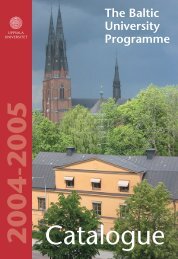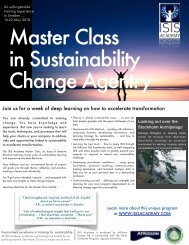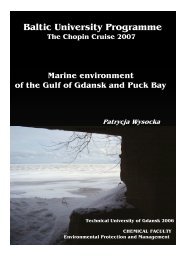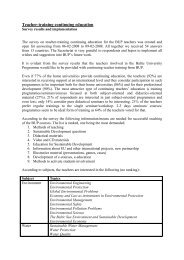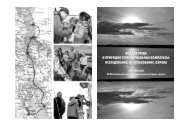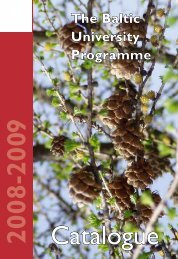Conference booklet - Baltic University Programme
Conference booklet - Baltic University Programme
Conference booklet - Baltic University Programme
You also want an ePaper? Increase the reach of your titles
YUMPU automatically turns print PDFs into web optimized ePapers that Google loves.
5.5 Development of education; safeguarding qualityThe <strong>Baltic</strong> <strong>University</strong> <strong>Programme</strong> has in various wayssupported universities, which have offered the courses,to safeguard quality and content.For each course package there are regular teachers’conferences, in which the content of the courses are discussedand developed. All courses have been introducedat a teachers’ conference. They serve to develop skills inthe subject, to introduce new methods of teaching, inspireteachers and to make possible discussions betweenteachers from different countries and, also importantly,between those from the same country. Teachers fromparticipating countries get an opportunity to know howcourses are conducted elsewhere. These internationalcontacts have often resulted in contacts later used forguest lecturing etc.The <strong>Baltic</strong> <strong>University</strong> teachers’ conferences includedevelopment of the didactics. Early on the concept ofthe development of a “learning environment” was introduced,partly prompted by the traditional focus onteaching, especially lecturing. Much of the developmentwork was done by Åbo Akademi <strong>University</strong>. Considerableefforts have been made to introduce modern technologies,especially ICT, in education and many universitieshave been equipped. Special teachers’ coursesjust dealing with didactics have been planned by ÅboAkademi <strong>University</strong>, with both a teachers’ manual and astudents’ manual, how to study and learn in a good andefficient way.The language is obviously of great concern in the <strong>Programme</strong>as in any international cooperation. In the <strong>Baltic</strong>Sea region there are 15 major languages spoken andused. English has the advantage of not being any of thesenational languages. Early on it was agreed that no specialeffort should be done to support the English language.Still in 2001 a seminar was arranged to discuss this andas a result a material to support English language for theEnvironmental Science book was developed.Courses under developmentThe <strong>Baltic</strong> <strong>University</strong> <strong>Programme</strong> is a partner in the Educationfor Change project financed by Erasmus <strong>Programme</strong>.The project aims to develop material and practices for didacticsfor Education for Sustainable Development (ESD).A course in how to develop ESD in the school system willbe offered at teachers’ training institutions in the BUP network.Lead partner is the Teachers training Department atUppsala <strong>University</strong> and project leader is WWF in Stockholm.BUP has a small role.A new course package “Ecosystem Health and SustainableAgriculture- EHSA” is developed since 2005. Atpresent an agreement has been reached with Sida on thepartial funding this project with 3 Mln SEK. Further effortsto finance this project are made. The project is developedtogether with partners at the Great Lakes Districtin the USA and Canada, coordinated by the <strong>University</strong> ofIllinois. An inception phase was conducted during spring2006 with visits to the Kaliningrad region and the Leningradoblast.6. RESEARCH6.1 GeneralThe <strong>Baltic</strong> <strong>University</strong> network consists of researchersand research projects have been initiated and conductedthroughout the history of the project. Research projectshave taken several forms.One mean is the research conferences. Most teachers’conferences have included a research dimension andstimulate the participants and ongoing research. A fewtimes research conferences without connection to aneducational project have been organised. One of themis the conference for historians and political scientistsin Gdansk in 1995, “Fifty years of peace in the <strong>Baltic</strong>Sea region.” The conference proceedings were publishedin cooperation between Gdansk <strong>University</strong> and Uppsala<strong>University</strong>. Another is the Kaliningrad symposium in2005, to be described below.A different mean is the cooperation concerning aspecial technique or method. One such technique, theGIS, is described below. Other techniques which may beconsidered include systems analysis, or systems dynamics.Hydrological modelling has also been proposed.The classic research cooperation relies on a commonresearch project. This has not been established in the<strong>Baltic</strong> <strong>University</strong> cooperation so far. The network has,however, excellent possibilities to conduct comparativeresearch in several areas. It has also a very good potentialto establish interdisciplinary research projects.Master student work is often a good way to promoteresearch projects. In spite of several efforts a systematicexchange of master students in the network has notcome about. Among the few projects carried out havebeen hydrological projects with Uppsala and Minsk andenvironmental science projects with Uppsala and severalPolish universities. Master students who stayed severalweeks or one semester in the other country werefinanced through the Swedish Visby <strong>Programme</strong>.6.2 Early projects – GIS laboratories, field station networkOne of the first research projects in the <strong>Programme</strong> wasconcerned with Geographical Information Systems, GIS,which was, in the early 1990s, in a stage of intense development.A grant of 1 Mln SEK was obtained fromthe Swedish Knut and Alice Wallenberg Foundation.Five GIS laboratories were equipped (in Uppsala, StPetersburg, Tartu, Riga and Kaunas), and a one monthcourse in GIS was conducted at Uppsala <strong>University</strong>.Digitalisation of maps constituted the beginning of researchcooperation. Since then work has continued inenvironmental science projects in water management(St Petersburg), biodiversity (Riga) and traffic and urbanplanning (Kaunas).Master student work at biological and geographicalfield stations is an excellent way to offer young researchersfield experiences, possibilities to collect data, and tostimulate international cooperation. At an early stagecooperation between field stations in the region wasinitiated. Two travelling seminars for researchers wereorganised reaching Poland, Sweden, Finland, and Russia.A proposed exchange of master students in the region15



